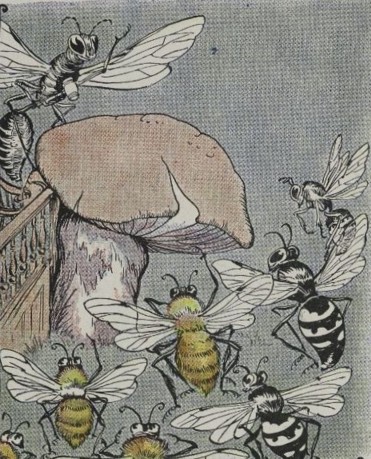| 1. hollow | /HOL-oh/ |
| -having a hole or empty space inside | |
| The insects hid in a hollow log. | |
| 2. declare | /dih-KLAIR/ |
| -to announce something clearly, firmly, publicly, or officially | |
| “I will not do it!” he declared. | |
| 3. belong | /bih-LAWNG/ |
| -to be in the right place or a suitable place | |
| This cabinet belongs in the living rooms. | |
| 4. treasure | /TREZH-er/ |
| -very valuable things, usually in the form of a store of precious metals, precious stones, or money | |
| When they went underwater they found treasure. | |
| 5. evidence | /EV-i-duhns/ |
| -one or more reasons for believing that something is or is not true | |
| She was charged with giving false evidence in court. |

When the Judge called the case, witnesses declared that they had seen certain winged creatures in the neighborhood of the hollow tree, who hummed loudly, and whose bodies were striped, yellow and black, like Bees.
Counsel for the Wasps immediately insisted that this description fitted his clients exactly.
Such evidence did not help Judge Hornet to any decision, so he adjourned court for six weeks to give him time to think it over. When the case came up again, both sides had a large number of witnesses. An Ant was first to take the stand, and was about to be cross-examined when a wise old Bee addressed the Court.
“Your honor,” he said, “the case has now been pending for six weeks. If it is not decided soon, the honey will not be fit for anything. I move that the Bees and the Wasps be both instructed to build a honeycomb. Then we shall soon see to whom the honey really belongs.”
The Wasps protested loudly. Wise Judge Hornet quickly understood why they did so: They knew they could not build a honeycomb and fill it with honey.
“It is clear,” said the Judge, “who made the comb and who could not have made it. The honey belongs to the Bees.”
Ability proves itself by deeds.
| 1. | What did the insects find in a hollow tree? |
| 2. | Whom did they let decide the matter? |
| 3. | When the Judge called the case, who were the witnesses describing? |
| 1. | What can you say about the attitude of the Wasps when they declared that the treasure was theirs? Please tell me more about it. |
| 2. | Do you think that they needed a judge to decide the matter? Why or why not? |
| 3. | Do you think a fight over the treasure would be appropriate? Why or why not? |
| 4. | Could you cite an instance when you were able to prove that you can do something? |
| 5. | Do you think you can know someone’s abilities just by only talking to him/her? Please tell me more about it. |
| Grammar 文法 |
Pronunciation 発音 | Vocabulary 単語 |
Comprehension 理解 |
|
|---|---|---|---|---|
 GOOD GOOD |
文法の誤りはほとんどなく、完全な文章で話すことができる | ほとんどの単語をはっきりと正しく発音することができる | 習った表現を適切に使うことができる | 文章を理解し、質問に正しく答えることができる |
 FAIR |
文法の誤りはあるが、完全な文章で話すことができる | 発音の練習が必要な言葉がいくつかある | たまにミスはあるが、習った表現を適切に使うことができる | 文章を完全に理解するのは難しく、質問に正しく答えられないときもある |
 POOR |
文章で話すのは難しく、単語だけで話すことができる | 発音の練習が必要である | 習った単語と表現を少しだけ使うことができる | 文章を理解するのは難しく、質問に答えるのは難しい |
An eBook from The Project Gutenberg.
This eBook is for the use of anyone anywhere at no cost and with almost no restrictions whatsoever. You may copy it, give it away or re-use it under the terms of the Project Gutenberg License included with this eBook or online at www.gutenberg.org